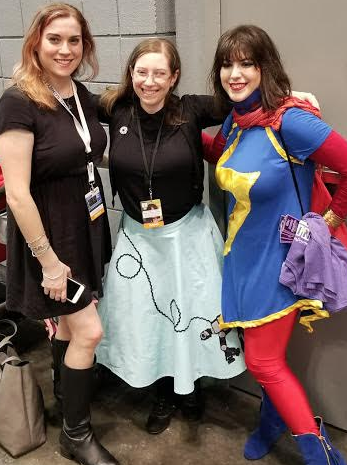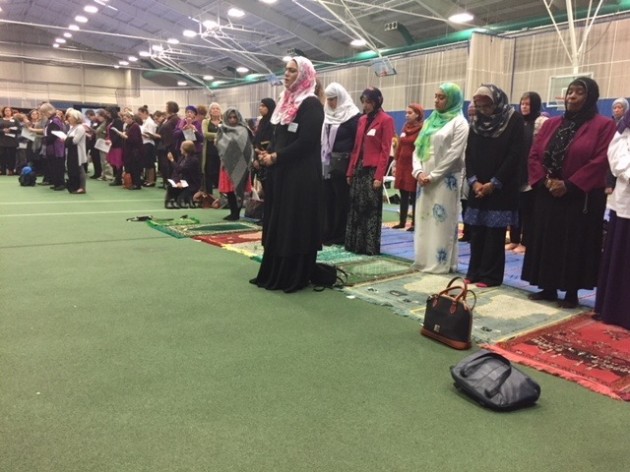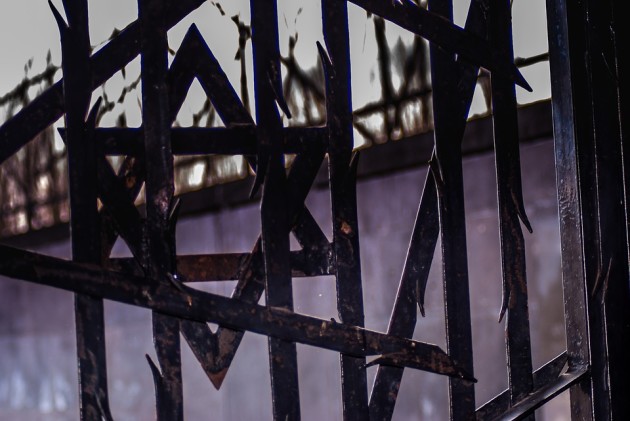The Lilith Blog
November 23, 2017 by Esther Kustanowitz
Why Jews Shouldn’t Stress About Thanksgiving
 It seems like you’ve just recovered from the lightning round of Jewish holidays – Rosh Hashanah, Yom Kippur, Sukkot, Sukkot, Sukkot, Sukkot, Sukkot, Sukkot, Sukkot (did I get all the Sukkot days in there?), Shmini Atzeret, Simchat Torah, and a collection of four or so Shabbatot – when you start seeing pilgrims and turkeys everywhere, and people start long text message chains about who is and isn’t coming “home” for Thanksgiving. The prospect of cooking a massive meal – AGAIN – isn’t something you have a lot of strength for. But here are five reasons why you – as a person who observed Jewish holidays a mere four weeks ago – shouldn’t stress over Thanksgiving.
It seems like you’ve just recovered from the lightning round of Jewish holidays – Rosh Hashanah, Yom Kippur, Sukkot, Sukkot, Sukkot, Sukkot, Sukkot, Sukkot, Sukkot (did I get all the Sukkot days in there?), Shmini Atzeret, Simchat Torah, and a collection of four or so Shabbatot – when you start seeing pilgrims and turkeys everywhere, and people start long text message chains about who is and isn’t coming “home” for Thanksgiving. The prospect of cooking a massive meal – AGAIN – isn’t something you have a lot of strength for. But here are five reasons why you – as a person who observed Jewish holidays a mere four weeks ago – shouldn’t stress over Thanksgiving.
1. You’ve already been through basic training. The Jewish holidays was your 80s training montage: rapid-fire holidays, coordinated menus, and if you’re observant of holiday restrictions, you’ve likely been trapped in the house or in synagogue for days on end. Thanksgiving is only a few hours long, you’re not racing any setting suns or candle lighting times or anything. People come, they eat, they leave. It’s the easiest holiday you’ll observe all year.
2. Provides opportunities for secular and halakhic debates. Are we celebrating the pillaging of a land and the slaughter of its indigenous people with every bite of cranberry sauce? Do you say Hallel – a prayer only traditionally said on Jewish holidays of celebration – on Thanksgiving? Do you add “shir hama’alot” to grace after meals? Is turkey even kosher? Just because it’s an American holiday doesn’t mean you can’t argue with your fellow Jews about it. And if those are boring, here’s one I just made up: kosher marshmallows are often made with fish gelatin; can you serve a marshmallow-and-sweet-potatoes dish at the same meal as a turkey? And what if there’s also beef? Do you need a separate fork to not mix poultry or meat with fish? Confused? Perfect – that’s how you know it’s working.
3. The election was last year. What this hopefully means is that political clashes will be fewer this year than they were last year, so everyone can focus their energy on spotlight issues like sexual harassment and assault, Twitter moving to 280 characters, and criticizing your family’s single or most financially unstable members. (That last one was a joke. Please don’t. I ALREADY TOLD YOU, I HAVEN’T MET THE RIGHT PERSON AND I’M A FREELANCER!!!)
- No Comments
November 21, 2017 by Sarah M. Seltzer
“Humorless Prig”? “Game Girl”? No One Escapes Toxic Misogyny
Leon Wieseltier didn’t harass all the women he worked with. For him, wrote Michelle Cottle in her bombshell Atlantic piece about the fabled editor: “Women fell on a spectrum ranging from Humorless Prig to Game Girl, based on how much of his sexual banter, innuendo, and advances she would put up with.”
There’s nowhere on that spectrum that’s a comfortable place to be.
Like many have this month, I found myself on an email thread with a group of women discussing our respective experiences with a known harasser in our circle. During the course of our chat, we asked a question many women have been asking: why some of us and not others? How do some people get lucky, and others get victimized?
Because when you read about widespread abuses that seem to hit every industry, every workplace, every woman, you can’t help but wonder: Why me, then? Why not me, the other time? While some misguided voices chimed in early on in this discussion to discuss women’s own behavior as a factor in this fight, we know from too many anecdotes that modesty is hardly a preventative shield, nor is age—nor even perceived beauty.
So what is it? In this particular case, it comes down to power and luck, as it almost always does: women in long-term partnerships, with notable networks of personal and professional support, had been largely left alone by this guy—while women directly reliant on him were targeted. And yet here we all were on the email thread, in solidarity with each other, in shared anger.
- No Comments
November 20, 2017 by Rebecca Mordechai
Jewish, Feminist, and Into Star Wars? There’s a Podcast for That.

From left to right: Tamar Herman, Michal Schick, and SM Rosenberg at New York Comic Con 2017. Photo credit: Avi Weinberg
Let’s do a bit of math: What do you get when you add together three Jewish girls and an array of opinions on Princess Leia, Stranger Things, and sci-fi? One revolutionary podcast that documents the intersection between Jewishness and fandom.
Nice Jewish Fangirls is a collaboration among Michal Schick, 30, Tamar Herman, 26, and Sarah Meira (SM) Rosenberg, 28, Modern Orthodox millennials who are as passionate about the feminism of Hermione Granger as they are inquisitive about how Judaism plays a part in the Harry Potter franchise. (If only J.K. Rowling would write a spin-off called Anthony Goldstein and the Magical Menorah.)
“There’s not many public forums for women in fandom, especially for Orthodox women,” Michal informed Lilith during a meeting. Before the podcast, Michal began the Facebook group Orthodox Ladies United by Fandom (OLUF). Michal’s group now has close to 2,000 women (of various Jewish affiliations) who eagerly test each other’s knowledge of Doctor Who and discuss why they’ll be watching Star Wars and Captain America over Chanukah.
Through OLUF, Michal formed a bond with Tamar and SM, two other self-professed geeks. Together, they partnered with Jewish Coffee House and created their podcast. “People don’t identify their Jewish identity or female identity with fandom, but we wanted to encourage people to do that,” said Michal.” Their platform validates Jewish fangirls’ obsessions and also works to address two levels of disenfranchisement.
- 2 Comments
November 17, 2017 by Chanel Dubofsky
How Tel Aviv’s New Bloody Hour Can Destigmatize Periods

Who do you talk to about your period? When I asked people this question, the answers included everything from other people who get their periods, their partner, their doctor, and of course, “No one.” One person told me she talks about her period with everyone, except cis men she doesn’t know. Another woman said she talks about it explicitly with cis men, because of the discomfort, rooted in misogyny, it causes, and that she’ll continue to do so until that discomfort is a thing of the past.
Would you tell a bartender that you had your period? At Anna LouLou, a bar and cultural center in the Jaffa neighborhood of Tel Aviv, you can get 25% off your bill during Bloody Hour, because typically, one bleeds for 25% of a month. Bloody Hour happens on Mondays, Tuesdays, Wednesdays and Saturdays, and the discount applies to the entire bar, all night. In order to get the discount, though, you have to report that you’re on your period (or whatever language you use to describe it).
- 1 Comment
November 16, 2017 by admin
Reflections from the Sisterhood of Salaam Shalom Conference
Three Lilith correspondents—Rishe Groner, Amy Stone, and Ann Jackowitz—attended the Sisterhood of Salaam Shalom fourth annual conference on November 5. Here is some background on the event we invited them to cover for our readers:
Sheryl Olitsky, is a former Fortune 500 corporate marketing executive and the wife and mother of rabbis. Atiya Aftab, is a former New Jersey Deputy Attorney General and the immediate past president of the NJ Muslim Lawyers’ Association. Together, they launched the Sisterhood of Salaam Shalom nationally in 2013 and convened the organization’s first annual conference in 2014. The number of attendees has since mushroomed six-fold.
The Sisterhood is the fastest-growing, grassroots movement of Muslim and Jewish women, with over 150 chapters, in more than 25 states, Washington, D.C. and Canada. More than 1000 women have put their names on the waiting list to join.
Its members are secular and religious Jewish women with German, Eastern Europe, Middle Eastern and Sephardic ancestry, and Muslim women of Turkish, Egyptian, Lebanese, Syrian, Iraqi, Iranian, Pakistani and Palestinian descent.
The Sisterhood consists of small groups of equal numbers of Jews and Muslims who meet regularly to share Shabbat dinners and iftars (meals eaten to break fast during Ramadan), get a better understanding of each other’s lives and faiths, concentrate on their similarities, respect their differences in a safe environment, without interference from the presence of men, and perform acts of tzedakah and sadaqa (note the similar pronunciations), one of which included helping Syrian refugees find shelters.

The Mincha and Asr prayers being held side-by-side. Mincha was led Andrea Hodos, creator of Moving Torah Workshops—physical, spiritual and intellectual. The Asr afternoon prayer was led by Tahera Ahmad, Director of Interfaith Engagement and Associate University Chaplain, Northwestern University. Photo credit: Amy Stone.
- No Comments
November 15, 2017 by Chanel Dubofsky
The Leftist Guide to Fighting Antisemitism That You’ve Been Waiting For

Jews for Racial and Economic Justice (JFREJ) today released a primer for activists on the Left about antisemitism. The 44-page document tackles the existence of antisemitism among both Jews and non-Jews on the Left and the uniqueness of Jewish oppression and its history—plus our current moment when antisemitism is again gaining momentum, and Jewish communities and their allies are reacting and defending.
The primer “is unique in how it addresses the ways in which antisemitism has been used to break apart movements for liberation,” says Julia Salazar of JFREJ. “Our paper highlights how antisemitism is deeply connected to capitalism and white supremacy. And while explaining the ties between these oppressive systems, the paper is also a valuable resource on who Jews actually are, in terms of racial diversity and range of class experiences. This challenges many of the myths and false stereotypes about Jewishness that fuel antisemitic ideology.”
- 2 Comments
November 14, 2017 by Sandra Korn
Why the President of the Jewish Studies Association Opposes the Anti-Semitism Awareness Act
 The House of Representatives is currently considering the Anti-Semitism Awareness Act, which would require the Department of Education’s Office of Civil rights to use a definition of anti-Semitism that includes demonizing, delegitimizing, and applying a double standard to Israel.
The House of Representatives is currently considering the Anti-Semitism Awareness Act, which would require the Department of Education’s Office of Civil rights to use a definition of anti-Semitism that includes demonizing, delegitimizing, and applying a double standard to Israel.
On Tuesday, November 9, the House of Representatives’ Judiciary committee held a hearing to discuss incorporating this language into the definition of anti-Semitism. Pamela Nadell, the president of the Jewish Studies Association, was among those who testified.
Sandra Korn caught up with Nadell over the phone on Sunday, after the hearings.
Sandra Korn: You testified last week at the House Judiciary Committee against the Anti-Semitism Awareness Act, with members of the Anti-Defamation League and Christians United for Israel speaking in favor of the bill. Can you talk a little bit about that experience?
Pamela Nadell: I consider it an important service to our nation that I had the chance to share my impressions about what is really a debate about whether Congress should pass a law establishing a definition of anti-Semitism that has a very real potential to restrict free speech on college campus.
I am a very proud Zionist. I am not anti-Israel. But I do respect the right of my students to express positions critical of Israel. Many of the people in the room from established Jewish organizations thought that this law could draw a line in the sand between criticism of the Israeli government and its policies, which would not be defined as anti-Semitic, and language criticizing Israel that crosses the line into anti-Semitism. I’m not certain the Act can do that.
I’m the president for the Association for Jewish Studies. We have very diverse members, and we avoid taking stances that fall outside our mission of teaching and research. But I am grateful to the many members of our organization—faculty teaching around the country who encouraged me to testify and who were very supportive after I spoke. I’m very gratified. While there were only two faculty among the witnesses, I know there are other faculty around the country and in Israel, who support me.
- 1 Comment
November 13, 2017 by Aileen Jacobson
Your Independent, Jewish and Frankly Feminist Review of “The Band’s Visit”
 Kristina Lenk’s right arm floats, gracefully and magically, as she sings about memories, emotions and desires—not that the rest of her body or her lovely voice aren’t just as expressive in “The Band’s Visit,” the new Broadway musical about sweet and bittersweet encounters between Jews and Arabs in a tiny Israeli town.
Kristina Lenk’s right arm floats, gracefully and magically, as she sings about memories, emotions and desires—not that the rest of her body or her lovely voice aren’t just as expressive in “The Band’s Visit,” the new Broadway musical about sweet and bittersweet encounters between Jews and Arabs in a tiny Israeli town.
Her swaying arm, however, seems to embody the complicated make-up of the actor’s character, Dina, a former dancer who, because of a romance gone bad that apparently derailed her career, has learned to “settle in” to a more constricted life as the proprietor of a cafe.
Dina seems to be happy enough, playing a central role in her community, confident, competent and in charge. She organizes her town’s response when an Egyptian band lands there by mistake, resulting in unexpected bonds. In Dina’s case, it also leads to revelations of her yearnings for a less lonely, more connected life. She embodies a dilemma that feminism hasn’t able been to solve: that of a strong woman who has made bold decisions but finds herself regretting some of them and reconciling herself to a life she didn’t choose.
The musical, based on a 2007 Israeli movie with the same title, had a highly praised, award-winning run at the Off-Broadway Atlantic Theater last December and January. Now, less than a year later, it has landed at the much-larger Ethel Barrymore Theater on West 47th Street, with an expanded though similar turntable set and most of the same cast. That includes the two leads, Lenk (who meanwhile took a starring Broadway turn in “Indecent,” about the scandal surrounding a 1920s Yiddish play, which can be seen on PBS’s Great Performances on Nov. 17, and Tony Shalhoub, who plays Tewfiq, the stiffly courteous leader of the hapless but grandly named Alexandria Ceremonial Police Orchestra.
The qualities that helped make the earlier stage production so beloved—the quiet intimacy, fable-like moments, and oblique hints rather than blatant announcements of its theme—remain intact. Could David Cromer’s carefully calibrated direction use more briskness? I don’t think so, though a friend who saw the show for the first time with me thought it could—just a tad. It also makes virtually no mention of the discomfort that Egyptians and Israelis might feel in each other’s presence. But an infusion of global politics would require a wider lens than the one chosen by Itamar Moses, the author of the musical’s book, and David Yazbek, the lyricist and composer who wrote a glorious score that mixes Middle Eastern inflections with pop melodies and more. The show focuses more narrowly on the human interactions, with a wry humor that is also understated.
The tone is set with projections of simple words during the overture: “Once not long ago a group of musicians came to Israel from Egypt.” That is followed by: “You probably didn’t hear about it. It wasn’t very important.”
The first scene, in an airport bus station, establishes how the band comes to visit an isolated town in the Negev desert. They are on their way to perform at the dedication of a new Arab Cultural Center in Petah Tivka (a real city with more than 230,000 inhabitants east of Tel Aviv). But they take a bus to sparsely-populated (fictional) Bet Hatikva, which they pronounce as though it is written Betah Tikva.
Once they arrive, the townspeople—well, Dina and the two guys who seem to hang out at her cafe all day long—set them straight about the vast gulf between p and b. (The Israelis and Arabs speak English to each other, because it’s their only common language, though both groups speak English imperfectly and laboriously, putting an accent on an underlying theme of communicating between cultures.)
As Dina sings in a jaunty song, Petah Tikva is “such a city, everybody loves it, lots of fun, lots of art, lots of culture.” Her town, with the fateful b, is “basically bleak and beige and blah blah blah.” It has no art or culture–and no hotel, either. She suggests (or commands, really) that the seven musicians and their conductor be divided up to board overnight at the cafe, at her place and at the home of the unemployed Itzik (John Cariani, who later sings a delicate lullaby to his infant son).

Dina chooses Tewfiq as one of her boarders, and it’s immediately clear that she finds the band leader attractive, despite his melancholy demeanor. Or perhaps because of it. He seems as alone and unmoored as she does. She shares some of her longings in the song “Omar Sharif,” about watching romantic movies with her mother, one of best songs among many moving melodies. Dina’s “Something Different,” especially as rendered by Lenk and her arm movements, is another standout. Something does indeed bloom between Dina and Tewfiq, though not what you might expect in a musical.
This show stays mercifully free of sentimentality. It does have a streak of old-fashioned sentiment, though, such as a man identified in the program as Telephone Guy (Adam Kantor) who has spent every night for at least a month silently staring at an outdoor public telephone waiting for his girlfriend to call. He’s not as metaphorical as a fiddler on the roof, but he could be one of the inhabitants of Anatevka. Late in the show, he sings a plaintive song, “Answer Me,” which the entire ensemble eventually joins in on.
That thoughtful tone, though, doesn’t mean the show is devoid of bright spots. It has many. For one thing, the band members often play their instruments on stage—very nicely and often rousingly, supplemented occasionally by a few offstage musicians.
At Itzik’s home, Israelis and Egyptians joyously sing a few stanzas of “Summertime” together, reveling in their common knowledge. The song sparks a recollection by Avrum (Andrew Polk), Itzik’s father in law, of how he first saw and fell in love with the woman who would become his wife. He explains the importance of music in the romance (“love starts when the tune is sweet”) in “The Beat of Your Heart,” a snappy ballad with a Latin infusion (“The Girl from Ipanema” is one of the tunes the lyrics refer to).
In another upbeat scene, band member Haled (Ari’el Stachel), a smooth fellow who previously exhibited a mildly creepy side by ineffectually coming on to nearly every woman he sees, redeems himself. In a mellifluous number, “Haled’s Song About Love,” he gently tutors the awkward Papi (Etai Benson) in a roller rink on how to woo his date, Julia (Rachel Prather).
It should be noted that, except for Dina, there are no major roles for women. Itzik’s unhappy wife, Iris (Kristen Sieh), makes an impression with her frustration at having to take care of an infant all day and all night, but that’s a brief sequence.
However, the whole show belongs to Dina. And to Lenk. At the end, she says the words seen at the beginning: “You probably didn’t hear about it. It wasn’t very important.” But it was.
The views and opinions expressed in this article are the author’s own and do not necessarily reflect those of Lilith Magazine.
- No Comments
November 9, 2017 by Justine Orlovsky-Schnitzler
When Your World Collapses from Acute-Onset Anxiety
 My world fell apart a week before Rosh Hashanah. One September morning I was drinking my usual four cups of tea, moving too quickly through the house, and dreaming up a thousand different ways my life could change. The next, I was awake before dawn, my breath shallow and hard to find, certain that death was imminent and the universe existed only to swallow us whole. I carried on like this for a few days—monitoring each thought and feeling as they emerged, hypervigilant and aware of myself to the point of feeling unreal. I was a moving puddle of tears and rolling fears, shuttling from bed to couch to bed again, never really sleeping in either place.
My world fell apart a week before Rosh Hashanah. One September morning I was drinking my usual four cups of tea, moving too quickly through the house, and dreaming up a thousand different ways my life could change. The next, I was awake before dawn, my breath shallow and hard to find, certain that death was imminent and the universe existed only to swallow us whole. I carried on like this for a few days—monitoring each thought and feeling as they emerged, hypervigilant and aware of myself to the point of feeling unreal. I was a moving puddle of tears and rolling fears, shuttling from bed to couch to bed again, never really sleeping in either place.
On the fifth day, I found myself between the stucco walls of the public clinic, tugging at my jeans and gently tearing apart the paper draped beneath my legs. This was the place that could see me on such short notice. I stared at the posters reminding me to make good choices, healthy choices, and I found myself muttering sadly, “I always do, I always do.”
The doctor who saw me diagnosed me with acute onset anxiety. No kidding. She inquired about my personal life, my job, my hobbies. Out of habit, I held back when I described my occupation—you never know how a stranger will react to self-identification. I told her I worked for a Jewish organization, and she must’ve sensed my hesitation. “You can tell me,” she said, without looking up from my chart, “I’m Jewish, it’s fine.” At the end of the visit, as she watched me roll my sleeve down over the spot where she’d drawn blood, she offhandedly grinned. “Anxiety passes, I promise.” I nodded mutely. “For people like us”, she continued, “It’s in our nature to be worried.” People like us. The floor opened up and devoured me, and I showed all my teeth as she trundled me off to the psychiatric nurse.
- 3 Comments
November 8, 2017 by Yona Zeldis McDonough
Of Blessed Memory: Linda Nochlin
Back at Vassar in the late 1970s, the vivacious, brilliant-yet-accessible professor was known as Mrs. Pommer, and her 200 and 300 level courses in 19th-century painting always filled up quickly. But to the wider world, she was known as Linda Nochlin, a trailblazing feminist art historian revered or reviled for her landmark 1971 essay, “Why Have There Been No Great Women Artists?” which demonstrated how, for centuries, institutional and societal structures had made it “impossible for women to achieve artistic excellence, or success, on the same footing as men, no matter what the potency of their so-called talent, or genius.”
Nochlin also challenged how “greatness” itself had long been defined. “In the field of art history, the white Western male viewpoint, unconsciously accepted as the viewpoint of the art historian, may—and does—prove to be inadequate not merely on moral and ethical grounds, or because it is elitist, but on purely intellectual ones,” she wrote in the essay, which was published in ARTnews.
Nochlin, who died on October 29, 2017, was a Brooklyn girl, born Linda Weinberg on January 30, 1931.
- 3 Comments
 Please wait...
Please wait...